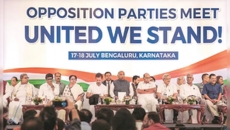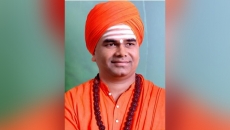New Delhi, Oct 16 (IANS) Prime Minister Narendra Modi will participate in the celebration of International Abhidhamma Divas and recognition of Pali as a classical language on October 17 at Vigyan Bhavan, New Delhi and will also address the gathering at the occasion.
Abhidhamma Divas commemorates the descent of Lord Buddha from the celestial realm after teaching Abhidhamma. The recent recognition of Pali as a classical language, along with four other languages, enhances the significance of this year's Abhidhamma Divas celebrations as Lord Buddha’s teachings on Abhidhamma are originally available in Pali language.
A special programme celebrating our rich culture! At 10 AM tomorrow, 17th October, I will take part in a programme to celebrate International Abhidhamma Divas and the Cabinet's decision of conferring Classical Language Status on Pali language. https://t.co/krG5Oavka8
— Narendra Modi (@narendramodi) October 16, 2024
The International Abhidhamma Divas celebration, organised by the Central government and the International Buddhist Confederation, will see the participation of academicians and monks from 14 countries and a significant number of young experts on Buddha Dhamma from various universities across India.
On October 3 the Union Cabinet, chaired by Prime Minister Narendra Modi approved to confer the status of Classical Language to Marathi, Pali, Prakrit, Assamese, and Bengali languages.
The Classical Languages serve as a custodian of Bharat’s profound and ancient cultural heritage, embodying the essence of each community’s historical and cultural milestone.
The Union Cabinet approved the recognition of five more languages as "classical", Union minister Ashwini Vaishnaw said, adding Marathi, Pali, Prakrit, Assamese, and Bengali have been included in the prestigious category.
"PM Modi has always focused on Indian languages…Today, five languages – Marathi, Pali, Prakrit, Assamese, and Bengali have been approved as classical languages," Vaishnaw said.
These languages join six others that have already been recognised as classical: Tamil, Sanskrit, Telugu, Kannada, Malayalam, and Odia.
The central government decided to create a new category of languages as “Classical Languages” on October 12, 2004, declaring Tamil as a Classical Language and setting the following as criteria for the status of Classical Language: High Antiquity of its early texts/recorded history over a thousand years. Secondly, a body of ancient literature/ texts is considered a valuable heritage by generations of speakers. Third, the literary tradition must be original and not borrowed from another speech community.
A Linguistic Experts Committee (LEC) was constituted by the Ministry of Culture under the Sahitya Akademi in November 2004 to examine the proposed languages for the status of Classical Language. The criteria were revised in November 2005 as follows: First, the high antiquity of its early texts/recorded history over a period of 1,500-2,000 years. Second, a body of ancient literature/texts is considered a valuable heritage by generations of speakers. Third, the literary tradition is original and not borrowed from another speech community. Fourth, the classical language and literature being distinct from modern, there may also be a discontinuity between the classical language and its later forms or its offshoots. Sanskrit was declared a Classical Language then.






